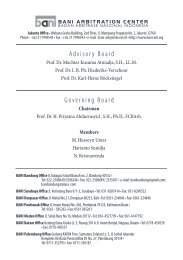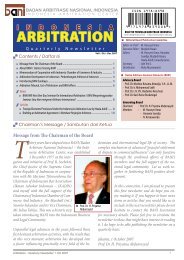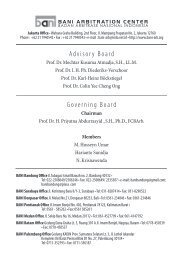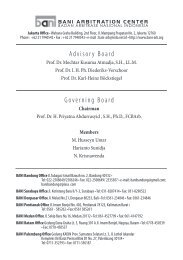Buletin Arbitrase Nasional Indonesia Nomor 10/2010 - Badan ...
Buletin Arbitrase Nasional Indonesia Nomor 10/2010 - Badan ...
Buletin Arbitrase Nasional Indonesia Nomor 10/2010 - Badan ...
You also want an ePaper? Increase the reach of your titles
YUMPU automatically turns print PDFs into web optimized ePapers that Google loves.
Role of Arbitration in <strong>Indonesia</strong> – One Way to Evade Judicial Corruption<br />
nesia. This is because corruption in <strong>Indonesia</strong> has been rooted and corruption<br />
appears to have continued in a more sophisticated form and become even more<br />
widespread. Besides, in <strong>Indonesia</strong>, corruption has been deeply rooted, in the<br />
political, economical and social systems.<br />
The cry for reformation reverberated in 1998 with the fall of the New Order<br />
regime, but since that time, there are still no signs that the incidence of corruption<br />
practices is diminishing. The roots of corruption seem to have dug so deep,<br />
to become so entrenched and so widespread as to make inroads nearly impossible.<br />
According to the World Economic Forum (WEF) in the period of 2008-<br />
2009, <strong>Indonesia</strong> is ranked 55 out of 134 countries in terms of competitiveness. <br />
This lack of competitiveness is influenced by corruption, inefficiencies in the<br />
bureaucracy and political instability.<br />
Additionally, today corruption is categorized as a very serious problem. It has<br />
invaded many countries such as the United States, Japan, the Philippines and so<br />
forth. The <strong>Indonesia</strong>n Government declared its commitment to eradicate corruption.<br />
The signing of the United Nations Convention by the <strong>Indonesia</strong>n Government<br />
recently has reflected the commitment of the government to eradicate<br />
corruption. If corruption is not dealt seriously it can ruin the economy of <strong>Indonesia</strong><br />
and eventually the legal system as well as the nation’s resilience. According<br />
to the <strong>Indonesia</strong>n history, <strong>Indonesia</strong> has attempted to eradicate corruption<br />
since 1950. In 1970, the Hatta commission was formed to eradicate corruption<br />
in <strong>Indonesia</strong>. Nonetheless, that commission was unsuccessful in reducing the<br />
number of corruption cases in <strong>Indonesia</strong>.<br />
Of course, <strong>Indonesia</strong> is not the only country to suffer from endemic and systemic<br />
corruption. The problem is of such worldwide significance that the United<br />
Nations on October 30, 2003 accepted the serious problem of corruption and<br />
promoted the Anti-Corruption Movement among member states of the United<br />
Nations (UNCAC: United Nations Convention Against Corruption, 2003, Paris)..<br />
The Secretary-General Kofi Annan declared in front of 191 member states of the<br />
General Assembly that: “The practice of corruption inflicts great pain on the poor.<br />
Corruption may become the main cause of the worsening of a country’s economy<br />
and is a hindrance to development and poverty reduction”.<br />
The <strong>Indonesia</strong>n government has currently been committed to eradicating corruption<br />
through various legal means. Nonetheless, it has not been successful in<br />
<br />
<br />
http://cetak.bangkapos.com/opini/read/473.html<br />
INDONESIA ARBITRATION - Quarterly Newsletter No. <strong>10</strong>/20<strong>10</strong>







